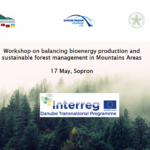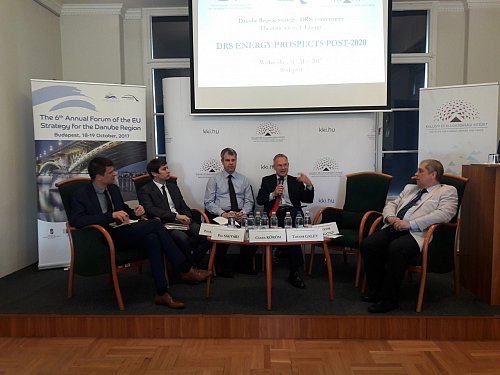SEMINAR HELD IN BUDAPEST ON THE ENERGY PROSPECTS OF THE DANUBE REGION
The event entitled “DRS Energy Prospects Post-2020” was the first in a sequence of three seminars on energy security, transportation development and clean connectivity to serve as a thematic buildup to the Annual Forum.
The morning session of the conference entailed a closed panel discussion between experts from DRS countries on issues pertaining to energy and climate, in accordance with the Chatham House Rule. The topics covered included gas market integration, the role of R+D, cross-border cooperation and the harmonization of national energy strategies with EU guidelines. Specific attention was devoted to the question of how best to capitalize upon potential political and business synergies between Member States in terms of energy.
The afternoon session was open to the public, and focused on the energy outlook for our region over the next decade(s). In his opening remarks, Ambassador Márton Schőberl, IFAT’s Director reflected on the various geopolitical forces affecting the Danube region from an energy perspective. Mr István Joó, Ministerial Commissioner for Water Diplomacy, Export and the Danube Region Strategy from the Ministry of Foreign Affairs and Trade of Hungary underscored the benefits of cooperation between DRS countries in line with the priorities of Hungary’s presidency. The second keynote speech, delivered by Mr Zoltán Deák, the Head of the Political and Economic Unit at the European Commission Representation in Hungary, highlighted the importance of the Danube region from the perspective of the EU’s macro-regional development strategies.
The ensuing panel discussion comprised five renowned experts. Ambassador Csaba Kőrösi, Director for Environmental Sustainability from the Office of the President spoke about long-term environmental challenges, stressing the need to step beyond traditional narratives of “pipeline politics” to address the multifaceted effects of decarbonization globally. Our invited foreign speakers, Mr Pavol Szalai (senior editor, EurActiv.sk, Slovakia), Mr Victor Logatskiy (leading expert on energy, Razumkov Centre, Ukraine), and Mr Todor Galev (senior analyst, Center for the Study of Democracy, Bulgaria) presented the medium-term energy policy outlook of their respective countries, also pointing out the social and environmental impacts of these strategies. Finally, Mr Pál Ságvári, Ambassador-at-Large for Energy Security from the Hungarian Ministry of Foreign Affairs and Trade, differentiated between the infrastructural challenges of the region in pre-2020 period, and the transformative changes awaiting the sector in the coming decades. The panel discussion was followed by a lively Q+A session. The moderator of the entire event was Ms Diána Szőke, senior analyst at IFAT.



